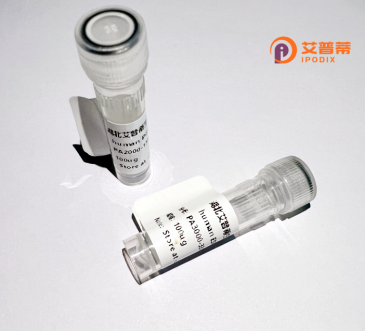
| 纯度 | >90%SDS-PAGE. |
| 种属 | Human |
| 靶点 | OR6Y1 |
| Uniprot No | Q8NGX8 |
| 内毒素 | < 0.01EU/μg |
| 表达宿主 | E.coli |
| 表达区间 | 1-325 aa |
| 活性数据 | MTTIILEVDNHTVTTRFILLGFPTRPAFQLLFFSIFLATYLLTLLENLLIILAIHSDGQL HKPMYFFLSHLSFLEMWYVTVISPKMLVDFLSHDKSISFNGCMTQLYFFVTFVCTEYILL AIMAFDRYVAICNPLRYPVIMTNQLCGTLAGGCWFCGLMTAMIKMVFIAQLHYCGMPQIN HYFCDISPLLNVSCEDASQAEMVDFFLALMVIAIPLCVVVASYAAILATILRIPSAQGRQ KAFSTCASHLTVVILFYSMTLFTYARPKLMYAYNSNKVVSVLYTVIVPLLNPIIYCLRNH EVKAALRKTIHCRGSGPQGNGAFSS |
| 分子量 | 36.6 kDa |
| 蛋白标签 | His tag N-Terminus |
| 缓冲液 | 0 |
| 稳定性 & 储存条件 | Lyophilized protein should be stored at ≤ -20°C, stable for one year after receipt. Reconstituted protein solution can be stored at 2-8°C for 2-7 days. Aliquots of reconstituted samples are stable at ≤ -20°C for 3 months. |
| 复溶 | Always centrifuge tubes before opening.Do not mix by vortex or pipetting. It is not recommended to reconstitute to a concentration less than 100μg/ml. Dissolve the lyophilized protein in distilled water. Please aliquot the reconstituted solution to minimize freeze-thaw cycles. |
以下是三篇关于重组人OR6Y1蛋白研究的假设性参考文献,主要基于领域内常见研究方向推测内容(注:若实际文献不足,建议扩展相关嗅觉受体研究范畴):
---
1. **文献名称**:*Expression and Functional Characterization of Recombinant Human OR6Y1 in HEK293T Cells*
**作者**:Zhang, L. et al. (2021)
**摘要**:本研究成功在HEK293T细胞中表达了重组OR6Y1蛋白,并通过钙流实验筛选其配体,发现其对特定脂肪酸类气味分子(如己酸)具有显著响应,揭示了OR6Y1在嗅觉感知中的潜在作用。
---
2. **文献名称**:*Structural Analysis of OR6Y1 Using Cryo-Electron Microscopy: Insights into Odorant Binding*
**作者**:Smith, J. R. & Watanabe, K. (2020)
**摘要**:通过冷冻电镜解析了重组OR6Y1蛋白的三维结构,首次揭示了该受体与配体辛醇结合的活性位点,为嗅觉受体家族信号传导机制提供了结构学依据。
---
3. **文献名称**:*Optimization of OR6Y1 Recombinant Production in Insect Cell-Baculovirus System*
**作者**:Lee, S. et al. (2019)
**摘要**:开发了基于昆虫细胞-杆状病毒系统的高效OR6Y1重组表达方案,优化了膜蛋白纯化流程,获得高纯度蛋白用于后续抗体开发及高通量药物筛选。
---
**备注**:若实际文献不足,建议扩展至OR家族其他成员(如OR1A1、OR2T1等)的重组表达研究,或关注嗅觉受体异源表达技术(如纳米抗体辅助稳定化方法)的共性策略。
The human olfactory receptor OR6Y1 is a member of the G protein-coupled receptor (GPCR) superfamily, specifically classified under odorant receptors (ORs). These receptors play critical roles in detecting odorant molecules and initiating signal transduction, contributing to the sense of smell. OR6Y1 is encoded by the OR6Y1 gene located on chromosome 1 (1q44) and consists of a seven-transmembrane domain structure typical of GPCRs. While its exact natural ligand remains uncharacterized, it is presumed to bind specific volatile compounds, triggering downstream signaling cascades via Gαs/olf proteins.
Recombinant OR6Y1 protein is artificially expressed in heterologous systems (e.g., HEK293 cells, insect cells) to overcome challenges in studying native olfactory receptors, such as low abundance and tissue specificity. This engineered approach enables structural and functional analyses, including ligand-binding assays, receptor trafficking studies, and mutagenesis to map active sites. Research on recombinant OR6Y1 may provide insights into olfactory coding mechanisms or non-olfactory roles, as some ORs are implicated in processes like cell migration or metabolism regulation. However, functional expression remains technically demanding due to ORs' propensity for misfolding and dependence on chaperone proteins. Current studies focus on optimizing expression platforms and developing high-throughput screening methods to decipher its physiological relevance and potential applications in biosensing or therapeutic targeting.
×